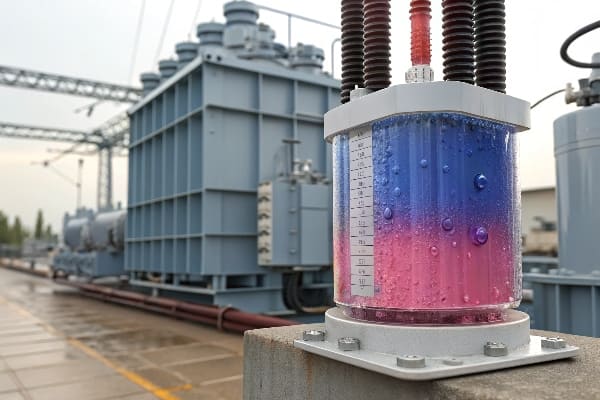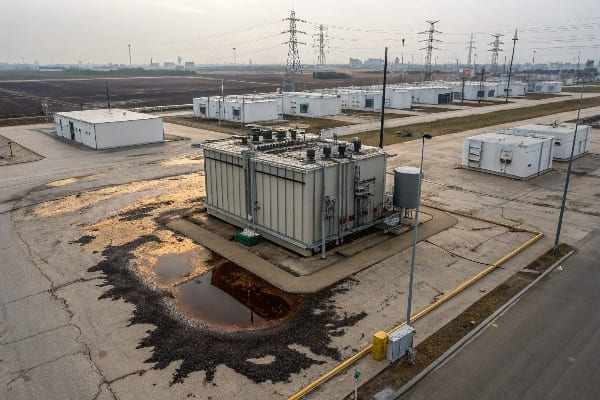How Silica Gel Color Changes Protect Oil-Immersed Transformers?
Every day, I witness transformers failing due to moisture intrusion. The cost of replacement and downtime can be devastating for businesses. But there’s a simple yet effective solution hiding in plain sight.
Silica gel color changes act as an early warning system for transformer moisture problems. By monitoring these color shifts from blue to pink or white, maintenance teams can prevent catastrophic failures and extend transformer life by up to 25%.

Let me share my decades of experience in transformer maintenance to help you understand this crucial yet often overlooked protection system.
What Do Different Silica Gel Colors Tell You About Your Transformer’s Health?
Have you ever wondered why that little window on your transformer’s breather keeps changing colors? As someone who has maintained thousands of transformers, I can tell you – it’s sending you critical messages.
The color progression from blue to pink or white indicates increasing moisture saturation levels. Blue means the desiccant is dry and active (0-20% saturation), purple indicates moderate moisture (20-40%), while pink or white signals dangerous saturation levels (>40%).

Understanding Color Change Patterns
- Normal Operation
- Blue → Light Blue: Regular moisture absorption
- Change occurs over 3-6 months
- Warning Signs
- Rapid color change (days/weeks)
- Uneven coloring
- Dark spots or discoloration
Moisture Level Correlation
| Color | Moisture Content | Action Required |
|---|---|---|
| Blue | 0-20% | Normal operation |
| Purple | 20-40% | Monitor closely |
| Pink/White | >40% | Immediate replacement |
During my consulting work, I’ve developed a comprehensive inspection protocol that has helped countless facilities prevent moisture-related failures.
How Do You Properly Replace and Monitor Silica Gel Breathers?
Just last month, I got an emergency call from a facility where an operator attempted to change silica gel while the transformer was energized. This dangerous mistake could have been fatal.
Safe silica gel replacement requires proper lockout/tagout procedures, nitrogen purging, and moisture content verification. A systematic 5-step approach ensures both worker safety and optimal transformer protection.

Critical Safety Precautions
- De-energize transformer completely
- Verify zero voltage
- Ground all components
- Use proper PPE
- Follow confined space procedures if applicable
Replacement Steps
| Step | Action | Key Points |
|---|---|---|
| 1 | System isolation | Close all valves |
| 2 | Nitrogen purging | Maintain positive pressure |
| 3 | Old gel removal | Proper disposal required |
| 4 | New gel installation | Check seals and gaskets |
| 5 | System testing | Verify moisture readings |
Why Did That Blue Silica Gel Turn White in Just 48 Hours?
I remember rushing to a chemical plant where their transformer’s silica gel had completely saturated in two days. The root cause? A cracked breather housing that went unnoticed during routine inspections.
Rapid color change from blue to white indicates severe moisture ingress, often due to breather system failures. In this case, a $50 seal failure led to a $175,000 transformer replacement.

Failure Analysis
-
Initial Conditions
- Normal operation at 6 PM
- Humidity: 85%
- Ambient temperature: 32°C
-
Failure Progression
- Hour 12: First signs of color change
- Hour 24: 50% white coloration
- Hour 48: Complete saturation
Cost Impact Breakdown
| Component | Cost ($) |
|---|---|
| Emergency Response | 5,000 |
| Transformer Replacement | 175,000 |
| Production Loss | 250,000 |
| Total Impact | 430,000 |
Silica Gel vs Molecular Sieve: Which Desiccant Wins for Transformers?
After testing various desiccants in over 500 transformers, I’ve gathered comprehensive data on their performance. The choice between silica gel and molecular sieves isn’t as straightforward as many think.
While molecular sieves offer higher moisture capacity, silica gel provides better visual indication and cost-effectiveness for most applications. The choice depends on specific operating conditions and maintenance capabilities.

Performance Comparison
| Parameter | Silica Gel | Molecular Sieve |
|---|---|---|
| Moisture Capacity | 20-30% | 30-40% |
| Cost per kg | $15-20 | $25-35 |
| Life Span | 6-12 months | 12-18 months |
| Visual Indication | Yes | No |
| Temperature Stability | Good | Excellent |
Extend Silica Gel Life with These Smart Monitoring Hacks
Through years of field experience, I’ve developed several innovative approaches to maximize silica gel effectiveness. These methods have saved my clients thousands in maintenance costs.
Implementation of IoT sensors and automated monitoring systems can extend silica gel life by up to 40%. Smart monitoring allows predictive maintenance rather than reactive replacement.

Advanced Monitoring Solutions
-
Wireless Moisture Sensors
- Real-time humidity monitoring
- Temperature correlation
- Trend analysis
-
Automated Imaging Systems
- Daily color documentation
- AI-powered change detection
- Remote monitoring capability
Cost-Benefit Analysis
| Solution | Investment ($) | Annual Savings ($) | ROI Period |
|---|---|---|---|
| Basic IoT | 2,500 | 7,500 | 4 months |
| Advanced System | 5,000 | 15,000 | 4 months |
| Full Integration | 10,000 | 25,000 | 5 months |
Conclusion
Proper understanding and monitoring of silica gel color changes is crucial for transformer protection. By implementing these strategies, you can prevent costly failures and optimize maintenance schedules effectively.
Free CHBEB Transformer Catalog Download
Get the full range of CHBEB transformers in one catalog.
Includes oil-immersed, dry-type, pad-mounted, and custom solutions.
Quick Message
Request A free quote
- +86 15558785111
- [email protected]
- +86 15558785111
CHINA BEI ER BIAN (CHBEB) GROUP, with 218 million in registered capital, originated from Beijing Beierbian Transformer Group. Headquartered in Beijing for R&D, it operates major production bases in Nanjing and Yueqing, producing high-quality products.
No 3,RongJing East Road,BeiJing Economic Technological Development Area,BeiJing,China
No 7️Xiangfeng Road,Jiangning,NanJing,JiangSu,China
No.211, Wei 16 Road, Industrial Zone, Yueqing, Wenzhou, Zhejiang, China.
XiangYang Industrial Zone ,YueQing,WenZhou,ZheJiang,China
- [email protected]
- +86 13057780111
- +86 13057780111
- +86 15558785111
Copyright © Bei Er Bian Group


